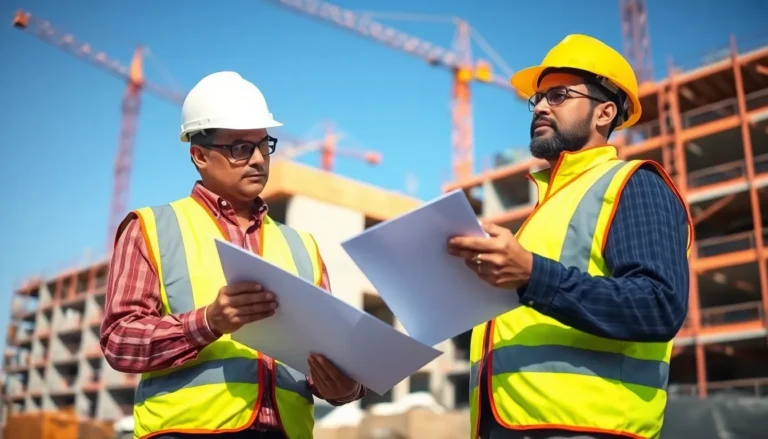Table of Contents
ToggleBuilding construction management isn’t just about hammers and nails; it’s the secret sauce that transforms blueprints into breathtaking structures. Imagine juggling timelines, budgets, and a dozen different subcontractors while keeping a smile on your face—sounds like a circus act, right? Well, that’s the daily grind for construction managers, and they’re the unsung heroes of the building world.
What Is Building Construction Management?
Building construction management involves the planning, coordination, and control of a project from inception to completion. This discipline ensures projects meet the client’s goals and adhere to specified timelines and budgets. Professionals in this field focus on several key areas, including project design, procurement, budgeting, and quality assurance.
Project managers play a crucial role in overseeing various phases, often coordinating between architects, engineers, and subcontractors. Effective communication frequently enhances teamwork and resolves potential conflicts. Managers also handle risk assessment and mitigation, identifying challenges before they escalate into bigger issues.
Budget management represents another essential aspect of construction management. On average, construction projects can exceed their initial budget by 10-20% if not meticulously monitored. Managers conduct regular financial assessments to track expenses and adjust as necessary to minimize cost overruns.
Timeline adherence remains a priority in building construction management. Delays can stem from material shortages, weather conditions, or labor issues. By implementing project scheduling tools and techniques, managers keep teams on track, facilitating timely completion.
Quality control processes ensure that all construction work meets established standards and specifications. Regular inspections and adherence to local building codes are critical. Managers enforce these standards throughout the project, helping to maintain safety and durability.
Building construction management represents a multifaceted discipline crucial for successful project outcomes. Focusing on effective communication, financial management, scheduling, and quality assurance leads to efficient construction processes and satisfied clients.
Key Roles in Building Construction Management

Building construction management relies heavily on specific roles, each contributing to the project’s success. Understanding these key positions clarifies responsibilities within a construction team.
Project Manager Responsibilities
Project managers lead construction projects by defining objectives and aligning resources. They develop project plans that outline timelines, budgets, and deliverables. Managing communication among architects, clients, and contractors ensures everyone stays informed. Regular progress meetings help in identifying potential risks, allowing for timely interventions. Budget monitoring remains crucial, as up to 20% of project costs may exceed initial estimates if not carefully tracked. Keeping stakeholders updated boosts confidence in the management process. Overall, project managers play a pivotal role in delivering successful building projects.
Site Manager Responsibilities
Site managers oversee daily operations on construction sites and ensure projects remain on schedule. They monitor work progress and enforce safety regulations, minimizing risks and maintaining compliance with local codes. Coordination among subcontractors falls under their purview, as effective communication is vital for workflow efficiency. Site managers handle inspections and quality checks to confirm that construction standards are met. Addressing any issues that arise on-site helps avoid delays and cost overruns. Their leadership directly impacts the success of the building process through constant supervision and proactive problem-solving.
Phases of Building Construction Management
Building construction management consists of three critical phases: pre-construction, construction, and post-construction. Each phase plays a significant role in ensuring project success and adherence to timelines and budgets.
Pre-Construction Phase
The pre-construction phase involves comprehensive planning and design activities. Project managers review architectural plans while consulting with stakeholders to align objectives. Site assessments address land conditions, potential challenges, and zoning regulations. Procurement processes begin by sourcing materials and subcontractors, ensuring costs stay competitive. A detailed project schedule establishes timelines for phases, creating a roadmap for execution. Cost estimates undergo rigorous examination, helping to prevent budget overruns. This phase sets the foundation for a successful project by fostering collaboration among all parties.
Construction Phase
During the construction phase, project execution takes center stage. Site managers monitor daily operations, inspecting work quality and enforcing safety protocols. Communication between managers and subcontractors remains ongoing to resolve conflicts swiftly. Regular progress meetings help track timelines, identifying any delays and implementing corrective actions. Material deliveries and equipment usage get closely monitored to ensure efficiency. Quality assurance checks are performed frequently to confirm compliance with local codes and standards. This phase emphasizes teamwork and coordination to meet project benchmarks without excessive overruns.
Post-Construction Phase
The post-construction phase involves project completion and final evaluations. Inspections determine if all work meets contractual obligations and standards. Completion reports summarize project outcomes, documenting successes and areas for improvement. Client walkthroughs provide opportunities for feedback and address any remaining concerns. Final payments and contractual agreements conclude the financial aspects of the project. Maintenance schedules may also be established to facilitate ongoing care of the completed structure. This phase solidifies the relationship between clients and construction teams, fostering satisfaction and potential future collaborations.
Best Practices for Building Construction Management
Effective communication is vital in construction management. Establishing clear channels among project teams ensures everyone understands their roles and responsibilities. Regular updates between architects, contractors, and clients help address concerns quickly. Utilizing project management software facilitates collaboration, allowing all stakeholders to view real-time progress. This approach enhances accountability, reduces misunderstandings, and fosters a cohesive environment.
Risk management strategies play a crucial role in successful construction projects. Identifying potential risks early can minimize their impact on budgets and timelines. Conducting risk assessments allows managers to prioritize issues like safety hazards and financial uncertainties. Implementing mitigation plans, such as contingency budgets or additional safety protocols, ensures preparedness. Continuous monitoring of risks throughout the project lifecycle is essential for adapting to emerging challenges effectively.
Building construction management is a multifaceted discipline that requires a blend of skills and strategies to navigate the complexities of each project. Effective communication and collaboration among all stakeholders are paramount for success. By prioritizing financial oversight and adhering to timelines, construction managers can significantly reduce the risk of cost overruns and delays.
Implementing best practices such as risk assessments and quality control measures not only enhances project outcomes but also fosters lasting relationships between clients and construction teams. As the industry continues to evolve, the role of construction managers will remain crucial in ensuring that architectural visions are transformed into reality while meeting client expectations and maintaining safety standards.




